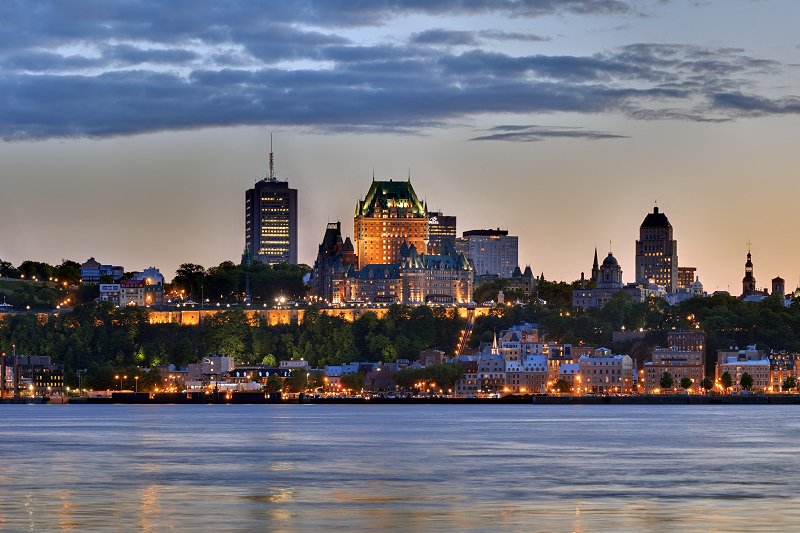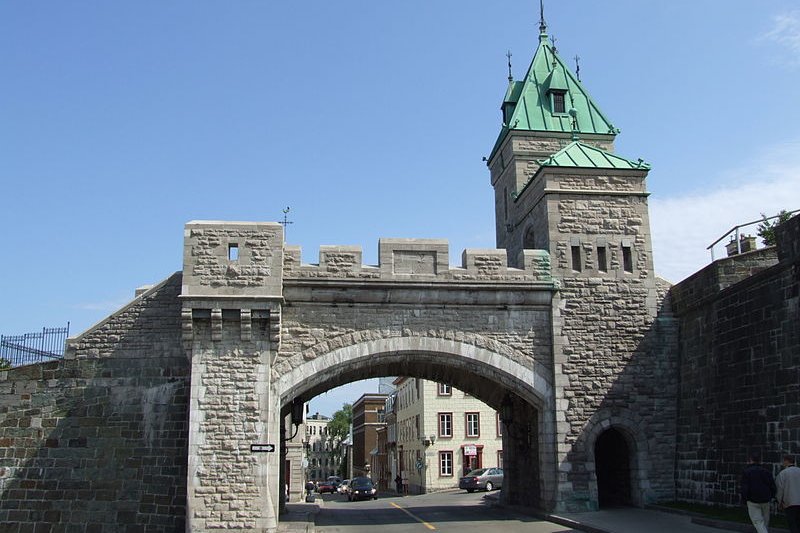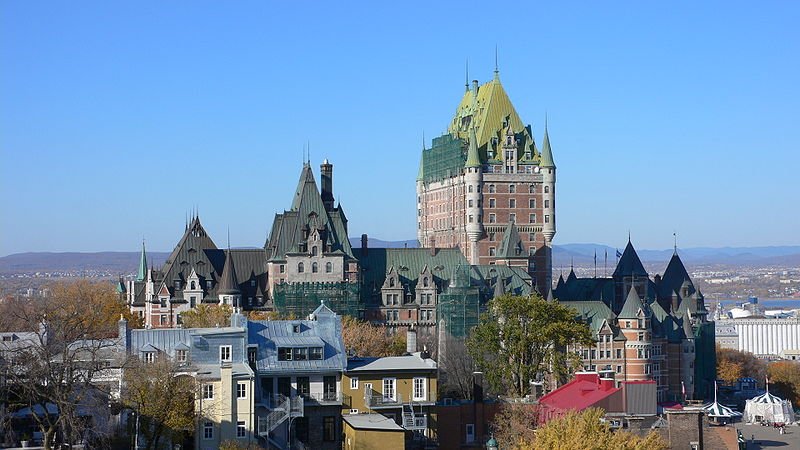 Quebec City, Canada
Quebec City, CanadaSource: https://commons.wikimedia.org/wiki/File:79_-_Qu%C3%A9bec_-_Juin_2009.jpg
Author: Martin St-Amant

Quebec City is the capital of the province of Quebec. It is the second most populous city in Quebec province after Montreal. There are around 490,000 people living in Quebec City, while 715,000 live in its metropolitan area.
Quebec is renowned to tourists for its well preserved inner city, or Old Quebec, also called Vieux-Québec in French. Old Quebec has the old remaining fortified city walls that are still standing north of Mexico. This is why Old Quebec was recognised as a World Heritage Site.
 Kent Gate, Quebec Fortification
Kent Gate, Quebec FortificationSource: https://commons.wikimedia.org/wiki/File:Qu%C3%A9bec_-_Fortifications_de_Qu%C3%A9bec_-_Porte_Saint-Louis_1.jpg
Author: Christophe.Finot

Quebec City is also one of the oldest European settlement in North America. While a number of towns are even older, Quebec City is the first to be established as a permanent settlement, not as a commercial outpost that evolved into a town. It is therefore the first non-Spanish European-built city in North America.
On and off for over four hundred years, Quebec City served as a capital city in Canada. It was the capital of French Canada and New France from 1608 to 1627, and 1632 to 1763. It became the capital of Lower Canada from 1791 to 1841. Then from 1852 to 1856 and from 1859 to 1866, it was the capital of the Province of Canada. It became the capital of the Province of Quebec for the first time from 1763 to 1791, and from 1867 until present day.
Travel to Quebec City
By PlaneYou can fly to Quebec City, arriving at the Jean Lesage International Airport, also called Aeroport de Québec, (YQB) in Ancienne-Lorette, about 20 minutes from downtown Quebec City.
Your choice of ground transportation from the airport is limited to the public bus RTC 78 for C$2.60, which only travel a few times a day between the airport and the city; and taxi, which charges a flat fee of C$32.50. Unfortunately there are no trains or airport shuttles. If you plan to travel a lot, I recommend you rent a car at the airport.
 Château Frontenac, Quebec City
Château Frontenac, Quebec CitySource: https://commons.wikimedia.org/wiki/File:Chateau_Frontenac.jpg
Author: Philipp Hienstorfer

Travel within Quebec City
Quebec City is a great place to explore on foot. It is quite compact, and the major attractions are all near one another. Some parts of town are quite steep, such as the Côte de la Montagne. If you get tired of climbing the slopes, there is a funicular train, called Funiculaire, that takes you from Breakneck Stairs (l'Escalier Casse-Cou) to Château Frontenac, all for C$2.00.Places of Interest in Quebec City
- Basse-Ville
Lower Town, oldest part of Quebec City at the foot of Cap Diamant. - Haute-Ville
Upper Town, this is the walled city with both the Catholic and Protestant cathedrals. - Château Frontenac
The luxury 19th-century hotel housed in the landmark building that towers over Quebec City. - Terrasse Dufferin
This is a broadwalk with benches and kiosks, from Château Frontenac to the Citadel. - Parc des Champs-de-Betaille
National Battlefield Park, site of grand monuments, and where the battle was fought that determined the future of Canada. - Assemblée Nationale
The provincial parliament of Quebec located just outside the walls of the Old City. - Fortifications de Québec
The fortifications built by the British in 1760 and turned into a tourist attraction since the 1970's. - Vieux Port
Old harbor area of Quebec City, a good place for a stroll. - Musée de la Civilisation
Modern limestone and glass building that houses exhibits on Quebec's history and culture. - Place Royale
The most history-rich park in Quebec City, site where the founder of Quebec, Samuel de Champlain, planted his garden. - Rue de Petit Champlain
Steep and narrow walkway also known as Breakneck Stairs. - Place d'Armes
Grassy square north of Château Frontenac used as a parade ground. - Basilique Notre-Dame-de-Québec
Principal seat of the Roman Catholic archbishop of Quebec. - Holy Trinity Anglican Cathedral
The first Anglican cathedral outside of Britain. - Rue du Trésor
Tiny alley where portrait artists work, located a short walk from the Holy Trinity Cathedral. - Monastère des Ursulines
Monastery of the Ursuline order of nuns in Quebec, founded in 1639 by Mère Marie de l'Incarnation. - Hôtel de Ville
Town hall of Quebec City, built in 1833 at the western end of rue de Baude. - Séminaire de Québec
Seminary for training Catholic priests comprising buildings from the 17th to the 19th centuries. - La Citadelle
The massive fort in Quebec City built started by the French in 1750 and completed by the British in 1831. - Sainte-Anne-de-Beaupré
One of the most sacred place in Canada is this shrine to the mother of the Virgin Mary originally built in the 17th century.
 Latest updates on Penang Travel Tips
Latest updates on Penang Travel Tips

Copyright © 2003-2025 Timothy Tye. All Rights Reserved.

 Go Back
Go Back